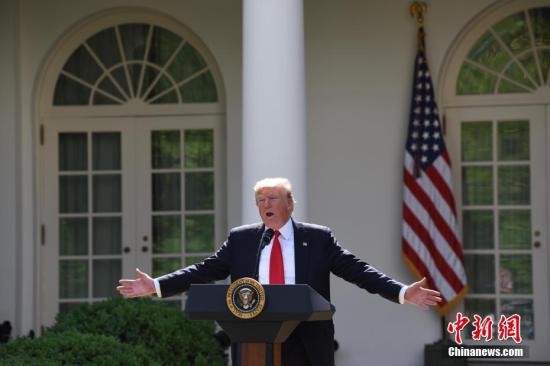Trump's Asia visit to outline his approach?
- By George N. Tzogopoulos
 0 Comment(s)
0 Comment(s) Print
Print E-mail China.org.cn, November 6, 2017
E-mail China.org.cn, November 6, 2017
 |
|
U.S. President Donald Trump [Chinanews.com] |
Barack Obama's pivot to Asia was a main pillar of American foreign policy until the presidential election of November 2016. New U.S. President Donald Trump does not seem to completely agree with the approach of his predecessor. Although his policy is not straightforward and sometimes shows signs of ambivalence, he has already challenged previous priorities.
His decision to withdraw from TPP is the most characteristic example. In his attempt to exhibit his opposition to multilateral free trade agreements, Trump is abandoning Obama's tactics to economically encircle China in the Asia-Pacific region.
Trump is making a tour in Asia having already created a policy vacuum. The role of the U.S. is weakened now that TPP can hardly be realized. It is indicative that Washington’s allies such as Japan are struggling to keep the process alive – even without the U.S. – which is practically impossible.
Other Asian countries have started to look for alternatives and positively see Chinese initiatives such as the RCEP and the Free-Trade Area of the Asia-Pacific according to President Xi Jinping’s proposal. No doubt Beijing is dynamically emerging as the driving force of regional integration in recent months.
The North Korea imbroglio will perhaps dominate the agenda of the American president in the next days. His insistence to press China to mediate and persuade Pyongyang to cooperate with the international community is not expected to be milder this time.
But this insistence cannot solve the problem. The Chinese administration is acting in line with UN Security Council resolutions and its perceived ability to shape alone the behavior of Kim Yong-un is over-exaggerated. For example, it is obviously suffering from the nuclear tests conducted by Pyongyang but cannot stop or prevent them.
For the time being, no one can be sure how far Trump wants to go regarding North Korea. He might be bluffing when he threatens with a war but he might not do so. The military option is on the table but the future risk of a pre-emptive military strike is high. It could cause a large-scale conflict in the Korean Peninsula with unpredictable consequences.
Trump will remain committed to strengthening his country's military alliance with Japan and South Korea. Despite the more co-operative tone of Secretary of State Rex Tillerson and Defense Minister James Mattis, the message sent to Pyongyang is that Washington’s ultimate goal is regime-change.
The discussion becomes even more complicated after the U.S. president de-certified the Iranian nuclear deal. Although this does not mean that the agreement will be abandoned at last, there is barely hope for it to function as a model for North Korea.
When agreements are breached, motivation for actors to follow a similar path in similar cases – where the proliferation of nuclear weapons threat exists – is diminishing. As a result, the timing for a breakthrough with Pyongyang is not convenient.
With reference to bilateral Sino-American relations, Trump does not differ from Obama on the South China Sea issue. He advocates for a muscular foreign policy in the region and is instructing American warships to protect "freedom of navigation."
This stance is not accepted by China. The latter calls for no external interference on the South China Sea and encourages countries of the neighborhood to find a solution. Another theme causing tensions in the relationship is Trump's will to possibly impose sanctions against China for intellectual property practices after the relevant probe he decided to initiative last August.
During his first trip to Beijing Trump will meet Xi for the third time, after Mar-a-Lago and Hamburg. Xi's leadership was recently endorsed by the 19th National Congress of the CPC empowering him to proudly negotiate and defend his country’s national interest.
Notwithstanding unquestionable differences the two leaders have found an efficient way to communicate and promote friendly consultations. Institutional dialogue on trade, security, culture, law enforcement and cybersecurity confirms the common will for better collaboration.
It is their responsibility to respond to challenges by coordinating actions and contributing towards a better understanding. The joint fight against the Islamic State comes to the forefront after the recent terror attack in New York. Also, the potential beginning of U.S. gas imports by China will demonstrate that progress can only be achieved through harmonious cooperation instead of unilateral initiatives triggering disputes.
One year after his triumph in the presidential election, Trump is travelling to Asia. His visit includes stops in Japan, South Korea, China, Vietnam and the Philippines. The more he is personally engaging with Asian leaders the clearer his strategy will be.
Arguments such as the need to adjust to developments after he came to power or his lack of experience in international affairs do rather constitute excuses. Trump has now a good opportunity to enlighten his partners about his Asia objectives for the coming three years. Turbulent times require clarity, good preparation and careful action.
George N. Tzogopoulos is a columnist with China.org.cn. For more information please visit:
http://www.china.org.cn/opinion/GeorgeNTzogopoulos.htm
Opinion articles reflect the views of their authors, not necessarily those of China.org.cn.






Go to Forum >>0 Comment(s)